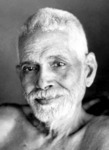Silence Is Unceasing Eloquence
 Solitude is an attitude. A man who adopts an attitude of detachment towards the external environment is always in solitude. It is possible that despite being involved in all sorts of worldly activity, a person may maintain perfect equanimity. That’s solitude. Another may stay on a hilltop, away from the hustle and bustle of city life, yet he may not be able to experience serenity of mind. Therefore, even though this person is much better placed to experience peace of mind, solitude deludes him.
Solitude is an attitude. A man who adopts an attitude of detachment towards the external environment is always in solitude. It is possible that despite being involved in all sorts of worldly activity, a person may maintain perfect equanimity. That’s solitude. Another may stay on a hilltop, away from the hustle and bustle of city life, yet he may not be able to experience serenity of mind. Therefore, even though this person is much better placed to experience peace of mind, solitude deludes him.
Silence is the perennial flow of ‘language’. It is interrupted by speaking; for words obstruct this mute language. It is quite possible that lecturers may keep the audience involved and amused for hours without transforming them. Silence, on the other hand, is permanent and benefits entire humanity in a subtle manner.
One may therefore conclude that true silence is unceasing eloquence -- it is a state when words cease and powerful thoughts of the sage begin to penetrate the depths of the seeker, bringing about a change in his thought patterns.
Thought moves with tremendous velocity. Those who entertain sublime and pious thoughts help others who are in the vicinity and at a distance also.
A saint who has overpowered his mind through meditation sends out into the world thoughts of harmony and peace. They travel with lightening speed in all directions and enter the minds of persons and produce in them also similar thoughts of harmony and peace.
Whereas a worldly man who harbours thoughts of jealousy, revenge and hatred sends out discordant thoughts which are like wireless messages broadcast in ether, and are received by those whose minds respond to such negative vibrations.
According to the Maharshi, preaching is simple communication of language; it can really be done in silence only.
A man, who after listening to a religious sermon for an hour, might go away without being even marginally influenced; he has wasted his time. In comparison, a man who sits in a holy presence and goes away after some time with his outlook on life radically changed, is much better off. Which is better, to preach loudly without effect or to sit silently sending out positive vibrations?
Again, how does speech arise?
From abstract knowledge emanates the ego; this, in turn, gives rise to thought, and thought gives rise to the spoken word. So it would not be wrong to say that the word is the descendant of the original source.
If the word can produce effect, consider how much more powerful must be preaching through silence?
But most people do not understand this simple truth -- the truth of their everyday experience. Rather, they are eager to know what lies beyond, about heaven, hell and reincarnation.
We may conclude with the following words of Ramana Maharshi: “Those who have discovered great truths have done so in the still depths of the Self. But really there are no others to be helped. For the realised being sees only the Self, just as the goldsmith sees only gold while valuing it in various jewels made of gold. When you identify yourself with the body, name and form are there.
But when you transcend body-consciousness, the ‘others’ also disappear. The realised one does not see the world as different from himself”.

No comments:
Post a Comment